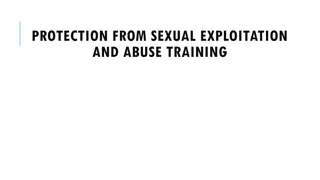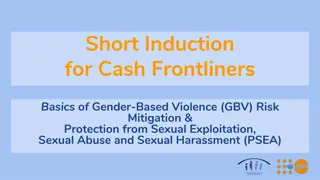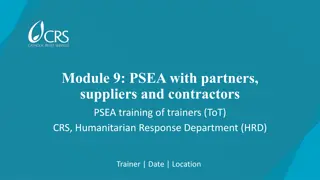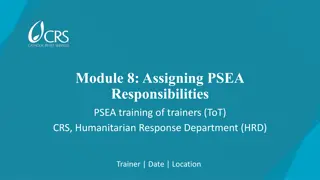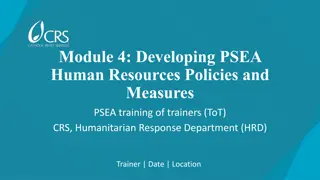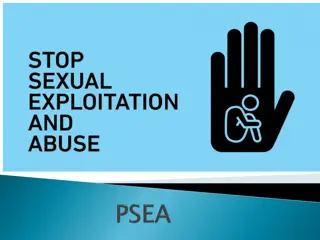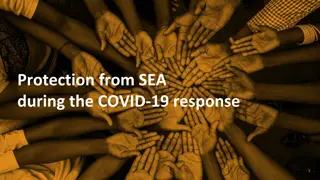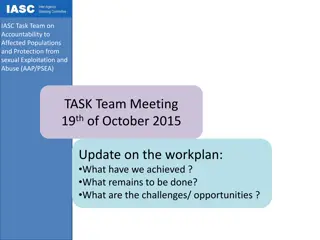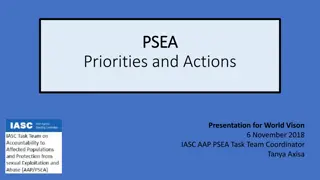Comprehensive Training on Protection from Sexual Exploitation and Abuse
This training program covers the history, key concepts, zero tolerance principles, roles and responsibilities, risk factors, consequences, community-based complaints mechanisms, human resources, protection of whistleblowers, and mandatory reporting related to protection from sexual exploitation and
1 views • 38 slides
Cash Frontliners: GBV Risk Mitigation & PSEA Induction
Responsibilities of cash frontliners in mitigating Gender-Based Violence (GBV) risks and protecting against Sexual Exploitation, Abuse, and Harassment (PSEA). Emphasizing the importance of treating beneficiaries with respect, ensuring zero tolerance for any form of exploitation, and implementing fee
0 views • 6 slides
Enhancing PSEA Engagement with Partners and Suppliers
Explore Module 9 on PSEA training of trainers, focusing on raising awareness and implementing requirements with partners, suppliers, and contractors in humanitarian and development projects. Understand the types of entities in relationships, the importance of commitment to PSEA, and engage in intera
0 views • 14 slides
Module 8: PSEA Roles and Responsibilities Training for Humanitarian Response Staff
This module outlines the training of trainers (ToT) on assigning PSEA responsibilities within CRS' Humanitarian Response Department. It covers sessions on roles and responsibilities for all staff and focal points, including exercises like World Cafe discussions and key responsibilities according to
1 views • 12 slides
Enhancing Human Resources for Preventing Sexual Exploitation and Abuse in Humanitarian Responses
This training module focuses on developing policies and measures to promote staff awareness and accountability in preventing sexual exploitation and abuse (PSEA) within humanitarian organizations. The sessions cover strategies for raising staff awareness, integrating PSEA responsibilities into job d
0 views • 22 slides
Understanding PSEA: Prevention and Response to Sexual Exploitation and Abuse in Humanitarian Settings
Sexual exploitation and abuse in humanitarian settings pose serious threats to vulnerable populations, directly contradicting humanitarian principles. The establishment of initiatives like the Iraq PSEA Network aims to prevent and respond to such misconduct through awareness-raising, capacity buildi
0 views • 14 slides
Protection from Sexual Exploitation and Abuse (PSEA) in COVID-19 Response
Amid the COVID-19 crisis, the risks of Sexual Exploitation and Abuse (SEA) are heightened, impacting vulnerable populations. It is crucial for humanitarian actors to uphold existing PSEA commitments and systems. SEA violates fundamental human rights, undermines trust, and has severe consequences for
0 views • 18 slides
Module 2: PSEA and Safe Programming Training of Trainers (ToT) by CRS HRD
This Module 2 focuses on PSEA and Safe Programming, covering key sessions on understanding safe programming, identifying protection and SEA risks, and mitigating risks. It emphasizes the importance of safe programming in increasing safety, dignity, and access, with staff playing a crucial role. Part
3 views • 19 slides
Guide to Completing PSEA Ad Hoc Withdrawal Form for NUS OFA Oct 2023
Follow this detailed guide to complete the PSEA Ad Hoc Withdrawal Form for NUS Office of Financial Aid for the October 2023 intake. Learn how to log in using SingPass, submit on behalf of a minor, provide documentation as a legal guardian, and select the correct category for your application. Ensure
0 views • 12 slides
Accountability and Protection Task Team Progress Update
The IASC Task Team on Accountability to Affected Populations and Protection from Sexual Exploitation and Abuse (AAP/PSEA) provided an update on their workplan achievements, remaining tasks, challenges, and opportunities. Progress includes establishing a common language for AAP and PSEA, advocating f
0 views • 14 slides
Enhancing Accountability and Safeguarding in the International Aid Sector
Priority- Setting and Actions Presentation for World Vision highlighted the global focus on addressing sexual exploitation and abuse. Donor commitments from DFID and UK NGOs, as well as UN initiatives, aim to combat misconduct. Despite existing mechanisms, challenges persist. Proposed solutions incl
0 views • 9 slides
